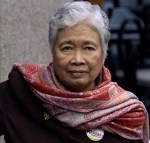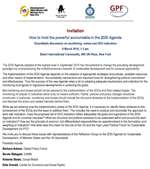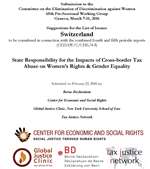Published on Thu, 2016-03-03 17:52
With huge money comes huge accountability. For Leonor Briones, lead convenor of Social Watch Philippines (SWP), the billions of funds that would be poured into the soon-to-be-established Bangsamoro government should undergo thorough audit to ensure proper spending and hold specific people responsible for how the money is spent. By the reckoning of Moro Islamic Liberation Front (MILF) chief negotiation Mohagher Iqbal, the Bangsamoro government will get an initial funding of about P70 billion in its first year of operation, from various sources, including the block grant from the government. |
Published on Thu, 2016-03-03 17:47
There are strong indications that inequality may substantially contribute to and exacerbate the emergence and the course of financial crises, even if other factors, in particular financial deregulation, obviously also play a crucial role, according to a United Nations human rights expert. This finding has been highlighted by Mr Juan Pablo Bohoslavsky, the Independent Expert on the effects of foreign debt and other related international financial obligations of States on the full enjoyment of all human rights, particularly economic, social and cultural rights, in a thematic report for the UN Human Rights Council, currently holding its thirty-first session. |
Published on Wed, 2016-03-02 10:27
Invitation to an event on March 8, 2016 in New York: The 2030 Agenda adopted at the highest level in September 2015 has the potential to change the prevailing development paradigm by re-emphasizing the multidimensional character of sustainable development and its universal applicability. The implementation of the 2030 Agenda depends on the adoption of appropriate strategies and policies, available resources and other means of implementation. Accountability mechanisms are important tools for strengthening political commitment and effectiveness. Thus the success of the new Agenda relies a lot on adopting adequate mechanisms and indicators for the monitoring of progress or regressive developments in achieving the goals. |
Published on Tue, 2016-03-01 15:03
Tax avoidance and evasion represent a systemic drain on government revenues needed for the fulfilment of women’s rights and gender equality. As the international human rights system begins to grapple with the consequences of tax policy for human rights, a groundbreaking initiative is about to shine a bright light into the dark corners of financial secrecy. Switzerland – arguably the world’s most important tax haven — may soon face scrutiny from the United Nations human rights system over its role in facilitating cross-border tax abuse. A coalition of civil society organizations has asked the Committee on the Elimination of Discrimination Against Women (CEDAW) — the UN body mandated to oversee compliance with governments’ legal obligations related to women’s human rights — to examine the extra-territorial impacts of Switzerland’s opaque financial legislation on women’s rights and gender equality, particularly in developing countries. |
Published on Fri, 2016-02-26 12:56
The debate about regulatory versus voluntary reporting that should be required of financial institutions is very much alive. This is one of the messages coming out of the Transparency and Accountability in the Financial Sector study done by the international civil society network Fair Finance Guide International (FFG). |
SUSCRIBE TO OUR NEWSLETTER







